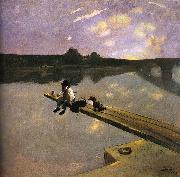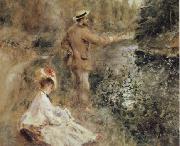Wholesale Oil Painting No Minimum |
|||||||||||
|
|
|||||||||||

|
|||||||||||
|
|
|
||||||||
Jean-Louis Forain1852-1931 French painter, printmaker and illustrator. Around 1860 he moved with his family to Paris, where he was taught by Jacquesson de la Chevreuse (1839-1903), Jean Baptiste Carpeaux and Andre Gill. He participated in the Franco-Prussian War (1870-71) and was a friend of the poets Paul Verlaine and Arthur Rimbaud; the latter is the presumed subject of a portrait (1874; priv. col., see 1982 exh. cat., no. 1) that may have influenced Manet late portrait of Mallarme (1876; Paris, Louvre). Forain first met Manet through his friendship with Degas in the early 1870s at the salon of Nina de Callias. He continued to associate with Manet, meeting the group of young Impressionists at the Cafe Guerbois and the Cafe de la Nouvelle Athenes. In 1878 Forain painted a small gouache, Cafe Scene (New York, Brooklyn Mus.), which probably influenced Manet Bar at the Folies-Bergere (1881-2; London, Courtauld Inst. Gals). |
||||||||
|
|
||||||||
The Fisherman
The Fisherman Painting ID:: 1237 |
1884 1884 |
|||||||
|
|
||||||||
Pierre RenoirFrench Impressionist Painter, 1841-1919 Pierre-Auguste Renoir (February 25, 1841?CDecember 3, 1919) was a French artist who was a leading painter in the development of the Impressionist style. As a celebrator of beauty, and especially feminine sensuality, it has been said that "Renoir is the final representative of a tradition which runs directly from Rubens to Watteau". Renoir's paintings are notable for their vibrant light and saturated color, most often focusing on people in intimate and candid compositions. The female nude was one of his primary subjects. In characteristic Impressionist style, Renoir suggested the details of a scene through freely brushed touches of color, so that his figures softly fuse with one another and their surroundings. His initial paintings show the influence of the colorism of Eugene Delacroix and the luminosity of Camille Corot. He also admired the realism of Gustave Courbet and Edouard Manet, and his early work resembles theirs in his use of black as a color. As well, Renoir admired Edgar Degas' sense of movement. Another painter Renoir greatly admired was the 18th century master François Boucher. A fine example of Renoir's early work, and evidence of the influence of Courbet's realism, is Diana, 1867. Ostensibly a mythological subject, the painting is a naturalistic studio work, the figure carefully observed, solidly modeled, and superimposed upon a contrived landscape. If the work is still a 'student' piece, already Renoir's heightened personal response to female sensuality is present. The model was Lise Tr??hot, then the artist's mistress and inspiration for a number of paintings. In the late 1860s, through the practice of painting light and water en plein air (in the open air), he and his friend Claude Monet discovered that the color of shadows is not brown or black, but the reflected color of the objects surrounding them. Several pairs of paintings exist in which Renoir and Monet, working side-by-side, depicted the same scenes (La Grenouill??re, 1869). One of the best known Impressionist works is Renoir's 1876 Dance at Le Moulin de la Galette (Le Bal au Moulin de la Galette). The painting depicts an open-air scene, crowded with people, at a popular dance garden on the Butte Montmartre, close to where he lived. On the Terrace, oil on canvas, 1881, Art Institute of ChicagoThe works of his early maturity were typically Impressionist snapshots of real life, full of sparkling colour and light. By the mid 1880s, however, he had broken with the movement to apply a more disciplined, formal technique to portraits and figure paintings, particularly of women, such as The Bathers, which was created during 1884-87. It was a trip to Italy in 1881, when he saw works by Raphael and other Renaissance masters, that convinced him that he was on the wrong path, and for the next several years he painted in a more severe style, in an attempt to return to classicism. This is sometimes called his "Ingres period", as he concentrated on his drawing and emphasized the outlines of figures. After 1890, however, he changed direction again, returning to the use of thinly brushed color which dissolved outlines as in his earlier work. From this period onward he concentrated especially on monumental nudes and domestic scenes, fine examples of which are Girls at the Piano, 1892, and Grandes Baigneuses, 1918-19. The latter painting is the most typical and successful of Renoir's late, abundantly fleshed nudes. A prolific artist, he made several thousand paintings. The warm sensuality of Renoir's style made his paintings some of the most well-known and frequently-reproduced works in the history of art.. |
||||||||
|
|
||||||||
|
|
The Fisherman
The Fisherman Painting ID:: 28669 |
1874
Oil on canvas 54 x 64 cm
Private collection (mk64) 1874 Oil on canvas 54 x 64 cm Private collection (mk64) |
||||||
|
|
||||||||
|
Pierre Renoir French Impressionist Painter, 1841-1919 Pierre-Auguste Renoir (February 25, 1841?CDecember 3, 1919) was a French artist who was a leading painter in the development of the Impressionist style. As a celebrator of beauty, and especially feminine sensuality, it has been said that "Renoir is the final representative of a tradition which runs directly from Rubens to Watteau". Renoir's paintings are notable for their vibrant light and saturated color, most often focusing on people in intimate and candid compositions. The female nude was one of his primary subjects. In characteristic Impressionist style, Renoir suggested the details of a scene through freely brushed touches of color, so that his figures softly fuse with one another and their surroundings. His initial paintings show the influence of the colorism of Eugene Delacroix and the luminosity of Camille Corot. He also admired the realism of Gustave Courbet and Edouard Manet, and his early work resembles theirs in his use of black as a color. As well, Renoir admired Edgar Degas' sense of movement. Another painter Renoir greatly admired was the 18th century master François Boucher. A fine example of Renoir's early work, and evidence of the influence of Courbet's realism, is Diana, 1867. Ostensibly a mythological subject, the painting is a naturalistic studio work, the figure carefully observed, solidly modeled, and superimposed upon a contrived landscape. If the work is still a 'student' piece, already Renoir's heightened personal response to female sensuality is present. The model was Lise Tr??hot, then the artist's mistress and inspiration for a number of paintings. In the late 1860s, through the practice of painting light and water en plein air (in the open air), he and his friend Claude Monet discovered that the color of shadows is not brown or black, but the reflected color of the objects surrounding them. Several pairs of paintings exist in which Renoir and Monet, working side-by-side, depicted the same scenes (La Grenouill??re, 1869). One of the best known Impressionist works is Renoir's 1876 Dance at Le Moulin de la Galette (Le Bal au Moulin de la Galette). The painting depicts an open-air scene, crowded with people, at a popular dance garden on the Butte Montmartre, close to where he lived. On the Terrace, oil on canvas, 1881, Art Institute of ChicagoThe works of his early maturity were typically Impressionist snapshots of real life, full of sparkling colour and light. By the mid 1880s, however, he had broken with the movement to apply a more disciplined, formal technique to portraits and figure paintings, particularly of women, such as The Bathers, which was created during 1884-87. It was a trip to Italy in 1881, when he saw works by Raphael and other Renaissance masters, that convinced him that he was on the wrong path, and for the next several years he painted in a more severe style, in an attempt to return to classicism. This is sometimes called his "Ingres period", as he concentrated on his drawing and emphasized the outlines of figures. After 1890, however, he changed direction again, returning to the use of thinly brushed color which dissolved outlines as in his earlier work. From this period onward he concentrated especially on monumental nudes and domestic scenes, fine examples of which are Girls at the Piano, 1892, and Grandes Baigneuses, 1918-19. The latter painting is the most typical and successful of Renoir's late, abundantly fleshed nudes. A prolific artist, he made several thousand paintings. The warm sensuality of Renoir's style made his paintings some of the most well-known and frequently-reproduced works in the history of art.. The Fisherman 1874 Oil on canvas 54 x 64 cm Private collection (mk64) |
||||||||
|
|
||||||||
|
Prev Next
|
||||||||
|
|
||||||||
|
Related Paintings to Pierre Renoir :. |
||||||||
|
|
||||||||
|
CONTACT US |


